Papal conclave: Runners and riders
- Published
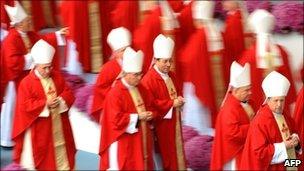
Cardinals are cocooned in the Vatican during the secret voting process
Pope Benedict XVI's successor will be chosen by 115 cardinal-electors during a secret election - known as a Conclave - in the Vatican's Sistine Chapel.
Canon Law states that any male who has been baptised is eligible to be elected, but since the late 14th Century the Pope has come from this body of Princes of the Church.
A post once almost exclusively held by Italians has most recently been filled by a Pole and a German, so the race is open, although the composition of the electors offers clues to who might be a frontrunner for the papacy - known as a papabile.
A two-thirds-plus-one vote majority is required, meaning the man elected is likely to be a compromise candidate. Sixty-seven of the electors were appointed by Benedict XVI, and 48 by his predecessor John Paul II.
About half the cardinal-electors (60) are European - 21 of those being Italian - and many have worked for the administrative body of the Church, the Curia, in Rome.
Thus, a candidate's credentials will be bolstered if he has Curial experience and affinity with Europe - a working knowledge of Italian is seen as a prerequisite.
But there is also speculation the new pontiff may come from one of the Church's growth areas - 42% of the world's 1.2bn Catholics come from Latin America, as do a sixth of the electors.
Here is a selection of the leading papabili.
Angelo Scola, Italy
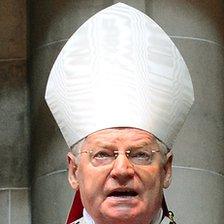
Cardinal Angelo Scola, 71, is the most prominent Italian candidate and has been referred to by one Catholic newspaper as the "crown prince of Catholicism".
A cardinal since 2003, he was appointed Archbishop of Milan in 2011. Cardinal Scola is a conservative, who has been close to both John Paul II and Pope Benedict, both personally and theologically.
In 2010, at the height of sex abuse allegations against the church, he called the media's attacks on the Pope "an iniquitous humiliation".
Given Pope Benedict's reasons for resigning, however, it is possible his relatively advanced age may stand against him.
Angelo Scola was born in the town of Malgrate, some 45km (28 miles) from Milan, in northern Italy.
He studied philosophy at the Catholic University of the Sacred Heart before entering the priesthood in 1970.
Much of the 1970s and 1980s were spent in academic positions - most notably in Munich, Paris, Fribourg and at the Pontifical Lateran University in Rome.
Interview with Giovanni Codega, Mayor of Cardinal Scola's home town
He also notably worked as the Italian editor of Communio, a journal co-founded by Joseph Ratzinger, the last Pope.
One of his major accomplishments has been to establish the Oasis Foundation, which encourages greater dialogue between Muslims and Christians in the Middle East.
He is considered to be a deep thinker, whose speeches can be wordy but who has a populist touch.
Marc Ouellet, Canada
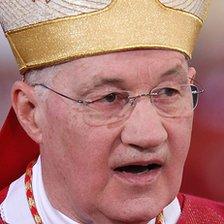
Cardinal Ouellet, 68, from Canada, has headed the important Congregation for Bishops since 2010 and has strong Curial connections.
A native French speaker who also speaks Spanish, English, Portuguese, Italian and German, he spent 10 years in Colombia and nine back in Canada before being appointed to teach at the John Paul II Institute for Marriage and Family in Rome in 1997.
Like Angelo Scola, he has strong links to Joseph Ratzinger's journal, Communio, and his thinking is closely linked with that of the last Pope. He also has close connections with the Latin American Church.
Marc Ouellet was born into a family of eight children in La Motte, Quebec. He was ordained a priest in 1968, and became vicar at a church in nearby Val d'Or, before heading to Latin America to teach in a seminary in 1970.
After a brief stint as vice-president of the Pontifical Council for Promoting Christian Unity, he was named Archbishop of Quebec in 2002 and appointed a cardinal in 2003.
Former Assistant Father Denis Belanger talks about Cardinal Marc Ouellet
But his time in Quebec has not been easy. Instead of being hailed as a local man made good, Cardinal Ouellet has been viewed by some as an imposition from Rome.
His comments on moral issues have not gone down well in Canada's largely secular society. He sparked controversy in 2010 when he said that abortion is unjustified even in cases of rape.
He once said becoming Pope "would be a nightmare", though he claims he was joking.
Gianfranco Ravasi, Italy
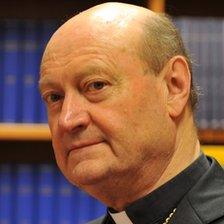
Cardinal Ravasi, 70, has been the president of the Pontifical Council for Culture - or the Vatican's culture minister - for the past five years and so has strong Curial and academic credentials.
A biblical scholar with a modern touch, he has helped popularise Scripture studies through Italian television, radio and popular magazines - and is known to drop in references to everyone from Aristotle to the late British singer Amy Winehouse.
Gianfranco Ravasi was born in Merate, Lecco, in northern Italy.
He was ordained as a priest in 1966, and studied in Rome before becoming director of the Ambrosian Library in his native Milan - a highly-regarded hub of theological scholarship.
Cardinal Ravasi's childhood friend Giovanni Battista Albani: "Instead of playing, his form of entertainment was praying"
A European intellectual seen as a "moderate" ecclesiologically, he is perhaps seen as lacking global experience. Some say the fact that he has never led a diocese may also count against him.
But he was chosen by the Pope to lead the six-day traditional Lenten retreat inside the Apostolic Palace, during which he was scathing about the "divisions, dissent, careerism and jealousies" that afflict Vatican bureaucracy.
Benedict XVI complimented his "brilliant" preaching, sent him a personal thank-you letter and invited him for a private audience.
Christoph Schoenborn, Austria
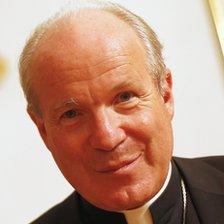
Cardinal Schoenborn, Archbishop of Vienna, is probably the strongest non-Italian candidate from within Europe.
The son of a Bohemian count, he was born in 1945 to a family with a long history of high office in the Catholic church and the Holy Roman Empire.
At the age of 18, Christoph Schoenborn entered a Dominican order. He studied at Dominican schools and universities in Austria, Germany and France before becoming a priest in 1970.
After his ordination, he studied further - including under the then Father Joseph Ratzinger in Germany - and took up academic positions and joined several theological commissions.
He became Archbishop of Vienna in 1995, and was made a cardinal in 1998.
Although intellectually conservative, close to Pope Benedict XVI, he has shown himself to be someone who is ready to listen to those who are calling for reform. He has also revealed a low tolerance for the child abuse scandals that have rocked the Church.
Mark Lowen talks to Austrian people about Cardinal Schoenborn
He had a high-profile spat with Cardinal Angelo Sodano, dean of the College of Cardinals, in 2011 after publicly criticising him for calling criticism of Pope Benedict's handling of the abuse scandals as "petty gossip".
A year earlier, he was forced to issue a clarification after suggesting it was time to re-examine the issue of priestly celibacy. He said he was not "seeking to question the Catholic Church's celibacy rule".
Although fluent in French, Italian, English, and Latin, some say electors may be reluctant to choose another native German speaker as the new Pope.
Odilo Scherer, Brazil
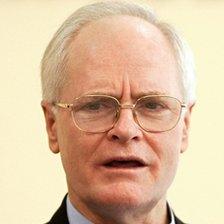
The archbishop of Sao Paulo, Cardinal Odilo Pedro Scherer, 63, is the most prominent Latin American candidate.
He heads Brazil's largest diocese in a city of 11 million people - more than 80% of whom are Catholic - and which include parishes that are dealing with high poverty rates, crime, unemployment and a lack of basic services.
Cardinal Scherer has also gained considerable Vatican credentials, having obtained his doctorate in theology from the Pontifical Gregorian University in Rome, and worked at the Congregation for Bishops there between 1994 and 2001.
Born to German immigrant parents in the Brazilian state of Rio Grande do Sul in 1949, Odilo Scherer went to study in Rome as a seminarian, before returning to Brazil to take up teaching and pastoral assignments in seminaries.
He was appointed auxiliary bishop in Sao Paulo in 2001, before becoming both Archbishop of Sao Paulo and, eight months later, cardinal in 2007.
Cardinal Scherer is a regular commentator on issues affecting people in Brazil, using his very active Twitter account as well his website and newspapers.
He has criticised the growing influence of Pentecostal churches in Brazil, and has vociferously opposed any attempts to liberalise Brazil's abortion laws. He also also spoken up against the deforestation of the Amazon.
People of Sao Paulo on Cardinal Scherer
Cardinal Scherer has been seen as a compromise candidate who could satisfy both European and Latin American congregations.
On the other hand, he has not been able to reverse a marked downward trend in the number of Catholics in Latin America.
Leonardo Sandri, Argentina
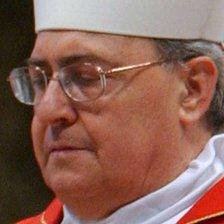
Cardinal Sandri, 69, was born in Buenos Aires in Argentina to Italian parents.
He served briefly as a parish priest before going to Rome in 1970 to study. Four years later, he entered the Vatican's diplomatic service - serving in Madagascar, Venezuela and Mexico as well as the United States between 1989 and 1991.
Between 2000 and 2007 he was third-in-command at the Vatican, serving as its chief of staff.
Towards the end of John Paul II's papacy, he became the ailing pope's spokesman, and it was Cardinal Sandri who delivered the announcement of the Pope's death in St Peter's Square 2005.
In 2007, he was made a cardinal, and now heads the Vatican department for Eastern Churches, helping churches based in North Africa and the Middle East.
His links to Latin America, as well as his understanding of how the Vatican works, make him, on paper at least, an ideal candidate for the job.
Religious TV host Tito Gabral talks about Cardinal Sandri
But his lack of pastoral experience and the fact that he has never been a diocesan bishop could work against him. He is also identified with an era when the Vatican appeared to ignore the growing number of sexual abuse allegations being made against priests.
A moderate, he is a popular figure in Rome, regarded as jovial and open, with a proven track record as an administrator, but some say he lacks the extra qualities needed to make Pope.
Peter Turkson, Ghana
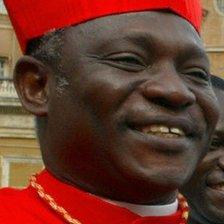
Born in western Ghana in October 1948 to a Methodist mother and a Catholic father, Peter Turkson became the first-ever Ghanaian cardinal in 2003 when he was appointed by Pope John Paul II.
The 64-year-old is the relator, or general secretary, of the Synod for Africa, making him a strong candidate to become the first African pope of the modern age, taking on a mantle that was held during the 2005 Conclave by Nigerian Cardinal Francis Arinze.
The last two Popes both served as relators for a synod of bishops.
Cardinal Turkson completed his basic theology at a seminary run by the Conventual Franciscans in New York and then taught in a seminary in his homeland.
He was ordained in 1975, and became one of the few Africans to undertake doctoral studies at the Pontifical Biblical Institute in Rome.
He was named Archbishop of Cape Coast in 1992, and served as president of the Ghana bishops' conference and Chancellor of the country's Catholic University.
Cardinal Turkson heads the Vatican's Council for Justice and Peace, which released a document in 2011 calling for radical economic reforms to deal with the global recession.
Reverend Martin Essilfie on his friend Cardinal Peter Turkson
The document condemned the "idolatry of the market", and Cardinal Turkson expressed support for the Occupy Wall Street protest movement.
Since taking up his Vatican post in October 2009, he has impressed people by his clear pastoral sense, a down-to-earth manner and a gentle sense of humour.
Theologically, he is seen as a moderate, signalling openness, for example, to the argument that condoms might be appropriate for couples where one partner is HIV-positive and the other is not.
Luis Tagle, Philippines

At 55, Luis Tagle is one of the youngest papabili or potential candidates.
He is archbishop of the Philippines' capital city, Manila - a 2.8 million-strong archdiocese - and he was made a cardinal only a few months ago, in November 2012.
Cardinal Tagle has gained a reputation as a man of the people - as bishop, he is once said to have ridden a cheap bicycle to a run-down neighbourhood in Manila, to deputise for a sick colleague.
He is also known for inviting beggars outside his cathedral to share a meal with him.
Luis Tagle was born in Manila, and studied in the Philippine capital and in the US before becoming a priest in 1982.
Following his ordination, he studied further in Rome before returning to the Philippine city of Imus, where he was made bishop in 2001.
People in the Philippines talk about Cardinal Luis Tagle
He was appointed to the International Theological Commission from 1997 to 2002, serving under the then Cardinal Ratzinger.
Tagle is one of the more media-savvy cardinals. He is a frequent broadcaster in the Philippines and has a presence on Facebook.
A charismatic figure, he has been described by the Vatican commentator John Allen as "a genuine intellectual with a popular touch".
Joao Braz de Aviz, Brazil
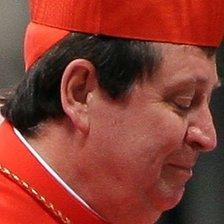
The 65-year-old from Brazil has had his reputation bolstered since taking over as prefect of the Congregation for Institutes of Consecrated Life and Societies of Apostolic Life in 2011.
The son of a butcher, he was born in Mafra, Santa Catarina, as one of eight children and completed his theological studies at Rome's Pontifical Gregorian and Pontifical Lateran Universities.
As a young parish priest in Brazil, Carinal Braz de Aviz was caught in the cross-fire of an armed robbery, with bullets perforating his lungs, intestines and an eye.
Although doctors were able to save his vision, some bullet fragments remain lodged in his body.
Having been made a bishop in 1994, he was appointed Archbishop of Brasilia in 2004. In May 2010 he organised the XVI National Eucharistic Congress to coincide with the 50th anniversary of the city.
A member of the Focolare movement, the cardinal has previously said one of his aims was to rebuild trust between Vatican and various religious orders.
He has also focused on the welfare of the poor as espoused by the liberation theology popular in Latin America.
The Brazilian was studying theology in Rome when the liberation movement was gaining momentum in his own country and the wider region.
But he has distanced himself from its ideological Marxist "excesses", saying they nearly caused him to leave his vocation.
"I lived with a lot of anguish during the years of the birth of liberation theology. I came very close to abandoning my priestly vocation and even the church," he said in a 2011 interview, external.
Timothy Dolan, United States
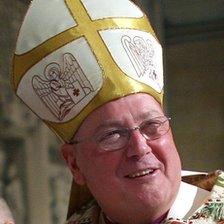
Cardinal Dolan, 63, from the United States, is the archbishop of the influential New York archdiocese.
He has extensive pastoral experience, having headed the Milwaukee diocese before that.
Named a bishop by Pope John Paul II and a cardinal by Benedict XVI, he is one of the newest members of the College of Cardinals.
An affable character who has also ably led the US conference of Catholic bishops, he has strong theological credentials, with a PhD in church history. He has spent time in Rome both as a student and as rector of the North American College.
Cardinal Dolan has also taken a strong stance against clerical sexual abuse.
In 2002, he headed an investigation into sexual abuse claims within the Archdiocese of St Louis, and dismissed several priests.
"It is impossible to exaggerate the gravity of the situation, and the suffering that victims feel, because I've spent the last four months being with them, crying with them, having them express their anger to me," he said at the time.
People in New York talk about Cardinal Dolan
Time Magazine named Cardinal Dolan one of the "100 most influential people in the world" for 2012, and his exuberant public persona has also made him popular with the Italian press in the lead-up to the Conclave.
However, the very fact that he is American may stand in his way - cardinals are generally seen as reluctant to promote figures from a perceived superpower state.
And despite his self-proclaimed fondness for sports and barbecue, Cardinal Dolan remains a conservative - albeit one who advocates presenting the church's teachings "in a more attractive way, external".